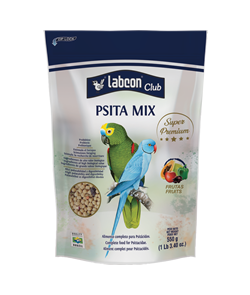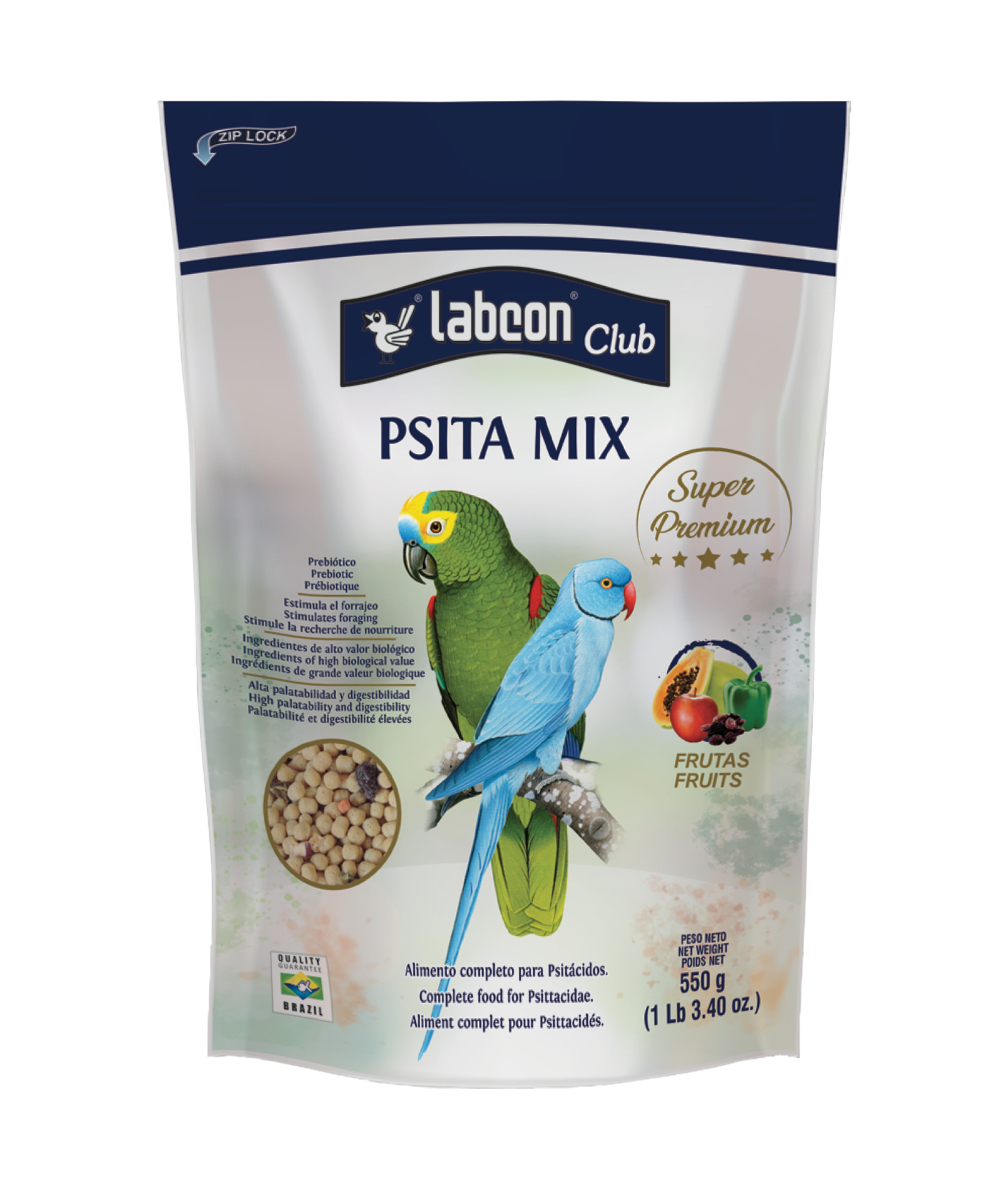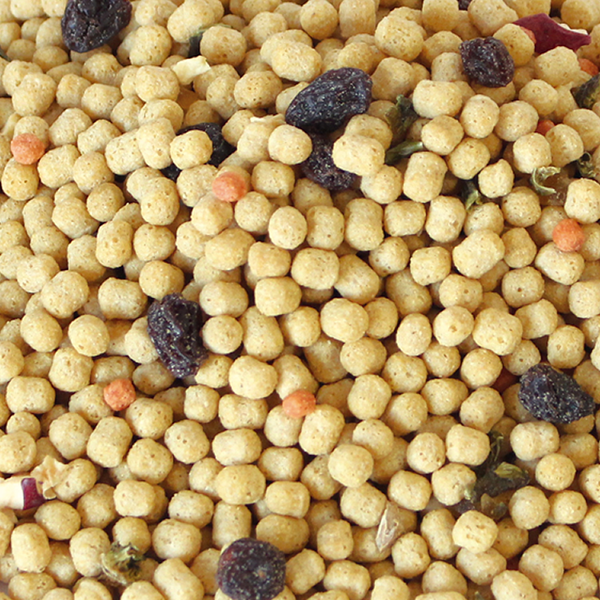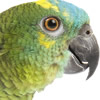Complete food for Psittacidae
Labcon Club Psita Mix is a complete food that has been scientifically designed to meet the nutritional and energy needs of large and medium-sized adult Psittacines such as Macaws, Parakeets, Cockatiels, Ring Necks and Eclectus Parrots, during the maintenance phase. Its balanced composition, without artificial colors or palatability enhancers, perfectly combines the extruded food with dehydrated fruits and greens. Contains selected ingredients, vitamins, minerals and prebiotics and offers excellent palatability and digestibility. In addition to nutritional benefits, it provides a feeding experience that stimulates the natural foraging behavior of birds. Labcon Club Psita Mix has been developed with a grain size and texture that promotes consumption and significantly reduces feed waste.
Feeding Guide
Birds should be fed several times a day. It is therefore important to keep Labcon Club Psita Mix always available in clean and dry feeders. Fresh fruits, vegetables and greens can be offered separately, as long as they do not exceed 20% of the total weight of the daily feed. Keep fresh and clean water always available. An adaptation period is very important, when this food is offered for the first time, to avoid nutritional stress and to promote the acceptance of the new food more efficiently. Mix the new product with the previous basic diet in accordance with the Food Switching Guide schedule here below. Labcon Club Psita Mix is a complete and balanced food. It is not recommended to add nutritional supplements to the diet during the maintenance period or without professional advice. It is essential to visit a specialized veterinarian periodically to ensure the health and well-being of the birds.
Food Switching Guide| Day 1 to day 5 | 25% new food - 75% previous diet |
| Day 6 to day 12 | 50% new food - 50% pervious diet |
| Day 13 to day 17 | 75% new food - 25% previous diet |
| From day 10 | 100% Labon Club Psita Mix |
| 150 - 250 g | 30 - 35 g |
| 250 - 350 g | 35 - 45 g |
| 350 - 500 g | 45 - 50 g |
These numbers can change significantly according to animal physical characteristics
Ingredients
Dehydrated Apple, Dehydrated Beetroot, Dehydrated Papaya, Dehydrated Carrot, Raisins, Dehydrated Green Pepper, Dehydrated Egg, Squid Meal, Prebiotic (Mannan-oligosaccharides - MOS), Dehydrated Inactivated Yeast, Minerals (Iron Sulphate, Copper Sulphate, Zinc Oxide, Manganese Monoxide, Sodium Selenite, Calcium Iodide, Iron Proteinate, Zinc Proteinate, Manganese Proteinate, Copper Proteinate, Chrome Yeast, Selenium Yeast, Calcium Carbonate), Vitamins (Vitamin A Supplement, Vitamin D3 Supplement, Vitamin E Supplement, Vitamin K3 Supplement, Vitamin C Supplement, Vitamin B1 Supplement, Vitamin B2 Supplement, Vitamin B6 Supplement, Vitamin B12 Supplement, Niacin, Calcium Pantothenate, Biotin, Folic Acid, Choline Chloride, DL-Methionine), Cassava Starch, Corn Flour, Texturized Soy Protein, Refined Soybean Oil, Soybean Meal, Flavoring Additive (Orange Flavor), Natural Colorings (Annatto Extract, Cochineal Carmine), Citric Acid (Preservative), Butylated Hydroxyanisole (Preservative), Butylated Hydroxytoluene (Preservative).
Guaranteed Analysis
| Crude Protein (min.) | 17.0 % |
| Crude Fat (min.) | 5.0 % |
| Crude Fibre (max.) | 5.0 % |
| Ash (max.) | 6.0 % |
| Moisture (max.) | 10.0 % |
| Calcium (min.) | 0.6 % |
| Calcium (max.) | 1.1 % |
| Phosphorus (min.) | 0.3 % |
| Mannan-oligosaccharides - MOS (min.) | 0.01 % |
| Iron (min.) | 70 ppm |
| Iron (max.) | 120 ppm |
| BHA (max.) | 10 ppm |
| BHT (max.) | 80 ppm |
Vitamins and Minerals per kg
| Vitamin A | 8,100 UI |
| Vitamin D3 | 1,350 UI |
| Vitamin E | 22.5 UI |
| Vitamin K3 | 2.3 mg |
| Vitamin B1 | 1.8 mg |
| Vitamin B2 | 6.8 mg |
| Vitamin B6 | 1.8 mg |
| Vitamin B12 | 9.0 mcg |
| Calcium pantothenate | 13.5 mg |
| Biotin | 0.09 mg |
| Niacin | 31.5 mg |
| Folic acid | 0.67 mg |
| Choline | 140.4 mg |
| Iron | 22.5 mg |
| Copper | 2.3 mg |
| Zinc | 22.5 mg |
| Manganese | 18.0 mg |
| Selenium | 0.07 mg |
| Iodine | 0.45 mg |
| DL-Methionine | 225.0 mg |
| Vitamin C | 67.5 mg |
The use of products not purchased through our official distributor can be harmful to the health of animals because their origin, as well as their transport and conservation conditions, are unknown.








